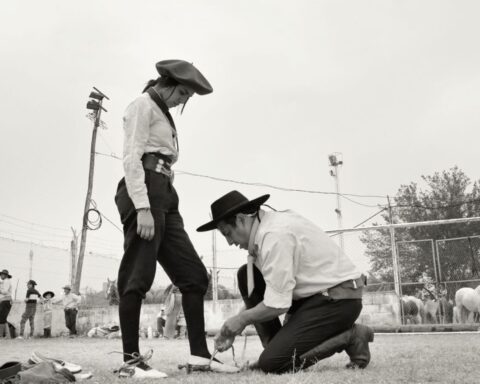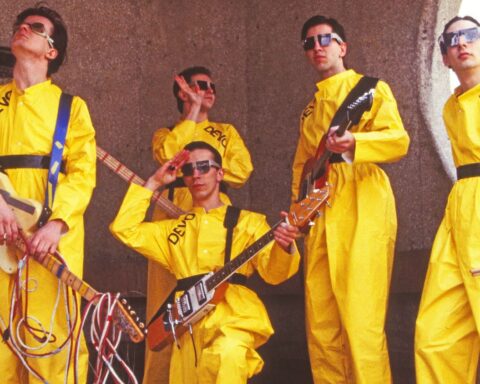After watching nearly two-dozen films that are broadly considered to be non-fiction, it’s time to close the chapter on this year’s Sundance film festival (See part one HERE). As always at any fest, there were a few surprises, most notably a film that at its heart was an assembly of dailies but became one of the best works I’ve seen in some time. Others danced around our very understanding of what it means to be POV cinema, while some, many unnamed, just sucked.
One of the unspoken themes this year surrounded several works labeled as documentary despite stretching the boundaries of what constitutes non-fiction filmmaking. The Land of The Enlightened takes a Nanook Of The North look at Afghanistan, providing a somewhat fictitious view into the young people of the plains as they confront warlords, hijackings, dangerous exploitation of minerals and the foreboding beauty of the locale. Filmmaker Pieter-Jan De Pue has spent decades in the area, and he shoots with a familiarity and intimacy with his subjects that’s at times quite astonishing.
Kate Plays Christine also plays with the documentary form, using scripted elements and broad improv to investigate the motivations that led a newscaster, Christine Chubbuck, to kill herself mid-broadcast. We witness the actor Kate Lyn Sheil coming to terms with Christine’s vanity and depression. As an investigation, it’s fascinating to get behind the artistic process, but I found the film dragged on, eventually becoming dull and repetitive over its nearly two hour running time.
Then there’s All These Sleepless Nights, a work that received an award for direction of a documentary film despite the fact that it’s being released in its native Poland as a fiction film. I had a particularly hard time with this one, especially seeing it back-to-back with White Girl, an obnoxious piece about an even more obnoxious woman who flagrantly displays her privilege, snorting coke and regularly getting into trouble. Despite its autobiographical leanings, White Girl didn’t have the temerity to call itself documentary, yet the same can’t be said for the latter work. I admit to checking out from this consecutive trauma (I may be scared for life after observing the tedium of naked blondes doing fake lines of cocaine), though I did give Nights another fair shot later in the fest. It still didn’t speak to me at all, with its ramshackle narrative of two Warsaw hipsters having existential fun only being sanctioned by clinging to loosely contrived non-fiction elements, but the film certainly had its many fans at the festival.
Both in terms of experimentation and execution the film of the festival is Kirsten Johnson’s Cameraperson. The film is an astonishing accomplishment, quilting together decades of disparate elements of Johnson’s own career as a cinematographer into one masterwork. It’s a film that elevates the form, showing the process of documentation while at the same time seducing the audience into hearing the remarkable stories that surround the capture of these images. From a tale of flicking away blades of grass after breathlessly running through a field to a sneeze that fouls a perfectly framed shot, this is a film that shows the fingerprints on the work, the chisel marks that go into creating the sculpture of non-fiction film. By turning the lens back on herself, and by finding those elements often left on the cutting room floor, Johnson has crafted a beautiful piece that is both epic and intimate.
Then there’s the pleasure derived from more conventional works like Weiner. Political docs have rarely been so engaging as this one. Capturing the return to political center stage of the embattled former congressman Anthony Weiner as he ran for mayor of New York City in 2013, his second fall is captured in near real-time, providing at times quite exhilarating episodes of vérité. Josh Kriegman and Elyse Steinberg weave a fascinating tale of the many facets of the campaign, in a style reminiscent of the stellar work of Hegedus and Pennebaker in The War Room. A nuanced tale of hubris, ambition, sexual obsession and other human frailties, Weiner is pretty impeccable.
Other notable works include Penny Lane’s Nuts!, a quirky look at medical quackery with charming animation and a brisk pace, and Jeff Feuerzeig’s Author: The JTLeroy Story, which offers an insider look into Laura Albert, the woman who inspired a cult following around her construction, the transgendered novelist Leroy, until it all came crashing down, creating one of the biggest literary scandals of recent times.
There were a number of disappointments that were more earnest than effective. Jim: The James Foley Story landed with a thud, taking the harrowing tale of an American war correspondent killed by ISIS and trudging it out for an inexcusably long two hour running time. Newtown, about the aftermath of a serial killing in a grade school, is about absence, yet it shied away too much from some of the more complex reactions from parents not showcased in the film, leaving an impression of a specific, weepy, audience-engaging look at grief but without delving into the hard questions that continue to plague that community. Plaza de la Soledad is again a fascinating subject, with a quiet and deliberate examination of some elderly prostitutes in Mexico, but it lacked the spark to stand above some of the more engaging works at the festival.
Overall, 2016 looks to be another fascinating one for documentary films, with many alternative means of distribution such as streaming becoming more mainstream for these works, allowing many more people a chance to see them outside of a festival run. Yet with a work like Cameraperson, a theatrical doc still has the capacity to both surprise and enthrall, providing memorable moments in a darkened theatre shared by a rapt audience, which is truly the best way to experience documentaries—or any great film.











